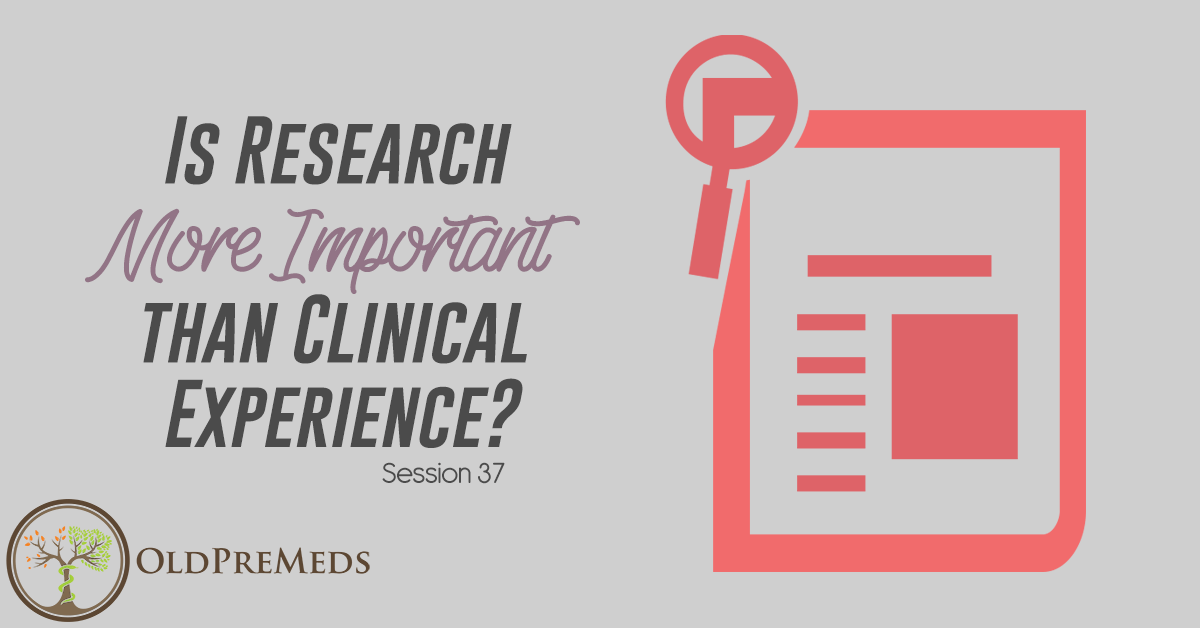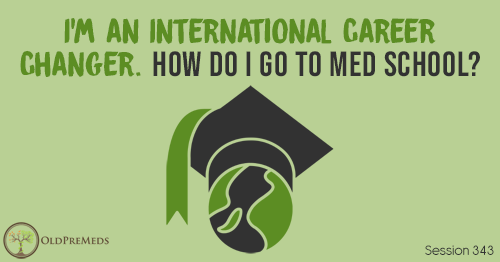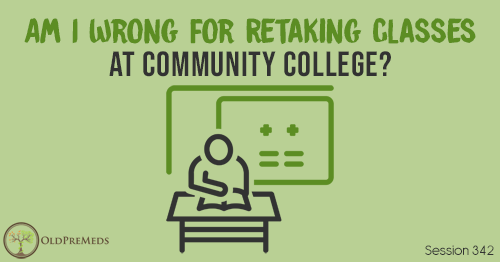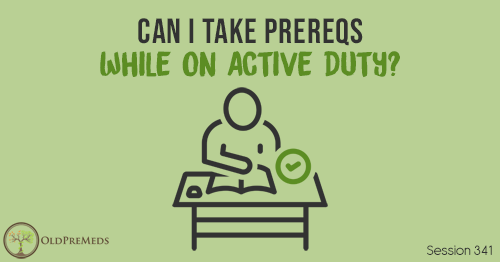Apple Podcasts | Google Podcasts
Session 37
This week’s OldPreMeds question comes from a student asking about research experience for medical school. Specifically, this student wants to know whether medical schools are biased towards applicants with research experience to the point that they would value it over clinical experience.
Listen to this podcast episode with the player above, or keep reading for the highlights and takeaway points.
OldPreMeds Question of the Week
As usual on the OldPreMeds Podcast, our question is taken from the Nontrad Premed Forum.
Looking through the MSAR Admissions Requirements, one of the things that jumped out at our poster was the percentage of accepted applicants with research experience. In many cases, schools reported higher numbers of accepted students with research experience than physician shadowing. For many medical schools, the MSAR shows 85-95% of matriculating students as having research experience.
Are admissions committees biased towards applicants with research experience, so much that they value it over clinical observation?Click To TweetAre admissions committees biased towards applicants with research experience, so much that they value it over clinical observation? Or is it that students are just reporting their lab experience from prerequisite coursework?
Shadowing Is Different from Clinical Experience
Before we talk about research specifically, I want to make a quick note about the purpose of shadowing and the purpose of clinical experience in the medical school application.
Medical schools need to understand that you know what it’s like to be a physician—hence, the importance of shadowing. You don’t need a ton of shadowing to understand what it’s like. However, shadowing is not the same as clinical experience.
If you're not close enough to smell the patient, it's not clinical experience.Click To TweetThe shorthand way to answer whether something counts as “clinical experience” is that if you’re close enough to smell the patient, it’s clinical experience, but if you’re working at the front desk, it’s not. While technically you’re close enough to smell patient when you’re shadowing, you’re still not really “smelling” the patient. You’re just observing when you’re shadowing. Maybe the doctor will let you listen to lung sounds or something, but it’s mostly passive.
Clinical experience involves patient interaction or getting your hands dirty doing patient care. Work like being a CNA, paramedic, EMT, nurse, or PA are great clinical experiences. This is arguably more important than shadowing, or it’s helpful to have more hours of it. But both shadowing and clinical experience add different things to your medical school application.
How Important Is Research for Medical School?
Research is something that is perpetuated as being a necessity to get into medical school, but it’s really not. I’ve talked to many deans of admissions, and research is simply not as important as clinical experience at the majority of medical schools.
My advice is to try research. See if you like it. Research experiences as a premed can vary a lot—it doesn’t need to be bench research. You could do clinical research working with patients. Or you can do research in a field that is not very close to medicine at all—geology research, for example. Working with a hypothesis and using the scientific method is what’s especially valuable about research experience as a premed.
My advice for premeds is to try research. See if you like it. But don't act like it's more important than clinical experience.Click To TweetBut most medical schools are not going to prioritize research experience as much as some premed myths have made it out to be.
Research Is More Important for Certain Medical Schools and Programs
When I say that research is not super important for medical school admissions, there are some caveats:
- If you want to go into an MD/PhD program, research is the main driver during your premed years. Prioritize research if you want to get into an MD/PhD program.
- If you want to go into a research-heavy institution, research is going to be very important. Look at the school’s website and see how much they emphasize research, see if they get a lot of NIH research funding, and see if they want students to have research experience.
[Related episode: Do You Need an MD/PhD to Do Research as a Physician?]
The Value of Research as a Premed
The actual act of research is not necessarily important, but it’s important that you understand the process. You don’t need to publish anything in order to get experience and gain some benefit from doing research.
As a physician, it’s just important that you’re able to read research articles and statistics and understand everything that goes on behind the scenes with researching and the scientific method.
The real point of doing research as a premed is to become familiar with applying the scientific method and understanding that process of inquiry.Click To Tweet[Related episode: Do I Really Need to Do Research as a Nontrad Premed?]
Major Takeaways from This Episode
Medical school admissions committees need to make sure that you know what life is like as a physician. There are several experiences you should have to demonstrate to them that you’ve put in work to see what a physician’s life is like.
At the end of the day, medical school admissions committees need to make sure that you know what life is like as a physician. Click To TweetShadowing shows you what’s it’s like to be a physician specifically. Clinical experience proves you actually like being around sick people. You don’t have to have research, but it helps to show that you’re comfortable with the processes behind producing knowledge for evidence-based medicine.
Look at each of the medical schools you’re interested in applying to. See what they require and then pursue what you enjoy the most after all of the requirements are met.
Links and Other Resources
- MSAR Admissions Requirements
- Check out my Premed Playbook series of books (available on Amazon), with installments on the personal statement, the medical school interview, and the MCAT.
- Related episode: Is My New Research Opportunity Worth It in the Long Run?
- Related episode: Is Research Required to be Accepted into Med School?
- Need MCAT Prep? Save on tutoring, classes, and full-length practice tests by using promo code “MSHQ” at Blueprint MCAT (formerly Next Step Test Prep)!












